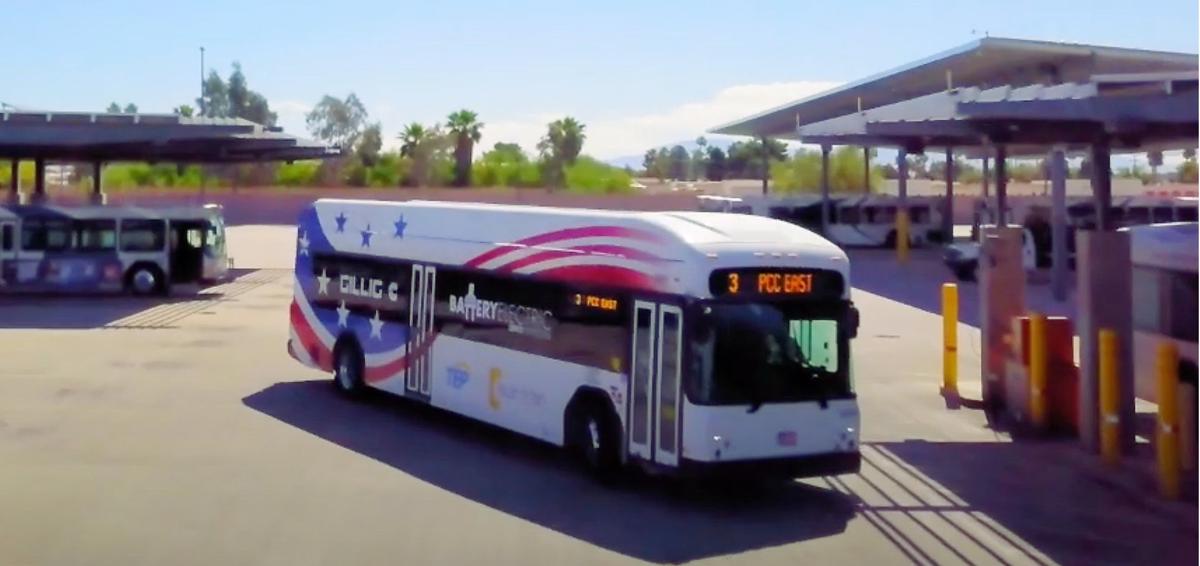Sun Tran’s first electric bus was put into service Sunday in an effort to help curb harmful greenhouse gas emissions.
It’ll provide riders with easier accessibility, a quieter ride and thus more comfortable trips while traveling around Tucson, Sun Tran said.
“Electric buses offer many benefits, including reducing pollution that disproportionately affects low-income families and contributes to the formation of ground-level ozone,” said Tucson Mayor Regina Romero in a video announcing the new bus.
The Environmental Protection Agency says nearly 30% of greenhouse gas emissions come from the transportation sector, which is the largest portion of emissions, according to the EPA’s most recent statistics.
The bus was produced by California-based manufacturer Gillig and will be in service for at least the next year as part of a pilot program.
Sun Tran said the electric bus will be used on various routes to test its performance in the transit system and in Arizona’s climate.
In August, Sun Tran announced the Federal Transit Administration had awarded it $2.6 million, which included funding for worker training to be able to care for the new technology and perform maintenance on the vehicles.
Sun Tran expects to add five more electric, zero-emissions buses in 2020. Those also will be funded by the Federal Transit Administration Low-No Emission Grant Program.
The grant program is an effort “to support the transition of the nation’s transit fleet to the lowest-polluting and most-energy-efficient transit vehicles,” the FTA said.
Sun Tran is working to phase out its oldest buses. The oldest biodiesel buses are around 13 years old. The average age of the buses is under seven years.
Since 2006, 100% of Sun Tran’s fleet has been powered by clean-fuel technology. The fleet runs on biodiesel, compressed natural gas and hybrid-electric power sources, Sun Tran said.
One drawback is that the electric buses have a high initial cost. Each bus can cost approximately $869,000, compared with a compressed-natural-gas bus at $525,000, said Pat Richter, a Sun Tran spokesman, in August 2019.
Tucson officials said they believe the added costs could be recouped through savings in fuel and maintenance throughout the life of the bus.
Tucson Electric Power built the recharging infrastructure with upgrades to Sun Tran’s electrical system and a new bus-charging system at no cost to Sun Tran.
“Using transit, even just one day a week, can significantly reduce congestion and greenhouse gas emissions,” Romero said.
“I encourage our community to try out our new electric bus. This is one step to making our community more climate-resilient, including electrifying our city’s vehicles and transit fleet.”
Down the Road
Lane restrictions this week for I-10 east of Tucson
There will be alternating lane closures along Interstate 10 east of Tucson this week for pavement preservation work.
Crews will work from 6 p.m. to 6 a.m. each day from Davidson Canyon to the Cochise County line, about 10 miles of road from Mileposts 286 to 296.
Drivers should use caution and watch for workers in the area.
ADOT begins project to aid border commerce
The Arizona Department of Transportation is beginning an 18-month infrastructure project to boost border business and make travel safer for Nogales motorists.
The $134 million project includes two flyover ramps on Mariposa Road to connect with Interstate 19 and keep commercial trucks from potentially having to stop three times at traffic lights after crossing the border.
Drivers using Arizona 189 should watch for short-term lane closures for exploratory drilling. No other lane restrictions are planned in the near future.





